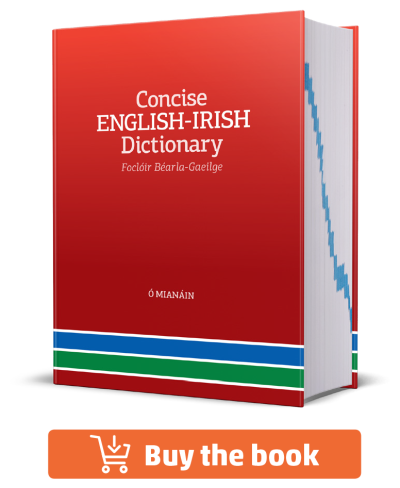Foclóir Gaeilge–Béarla
Ó Dónaill, 1977
An Foclóir Beag
Ó Dónaill & Ua Maoileoin, 1991
English–Irish Dictionary
de Bhaldraithe, 1959
Grammar
Pronunciation
mainteach
maintín
maintíneacht
maintis
maintíse
maintithe
maintlín
maíomh
maíomhachas
maíomhéacht
maíonn
mair
mairbh
mairbh-
mairbhe
mairbheach
mairbhíoch
mairbhiteach
mairbhití
mairbhleach
mairbhne
mairc
mairceach
maíomh could be a grammatical form of:
maígh »
maíomh, m. (gs. as s. -ímh, as vn. -íte). 1. vn. of maígh1. 2. Statement, assertion. ~ gaoil, declaration of, claim to, relationship. D’imigh siad as ~, they are of no account any more. 3. Boast. ~ a dhéanamh as rud, to boast of sth. Cúis mhaíte, something to be proud of. Ní ~ ná mustar dó é, it is nothing for him to glory in. S.a. mogall 1. 4. Begrudging, envy. ~ éadála ar dhuine, envying of good fortune to s.o. (Var:maíochtáil f, maíochtaint f)
RELATED MATCHES
IN FOCLÓIR GAEILGE—BÉARLA
PHRASES
IN FOCLÓIR GAEILGE—BÉARLA
Maíomh na bh~ folamh, vain boasting.
Ag maíomh a uaisle agus a fholaíochta, boasting of his nobility and descent.
~ a mhaíomh ar dhuine, to claim relationship with s.o.
Ag maíomh ginealais ar dhuine, claiming descent from s.o.; claiming to be of common origin with s.o.
An té atá mé a mhaíomh, the person to whom I refer.
Ní hé sin an rud atá mé a mhaíomh, that is not what I am saying.
Ná bíodh sé le maíomh ort (go), let it not be said of you (that).
Gaol a mhaíomh le duine, ar dhuine, to claim relationship with s.o.
Maíomh as rud, to boast of sth.
Ag maíomh as a shinsir, bragging about his forbears.
Is beag atá aige le bheith ag maíomh as, he has little to brag about.
Ní á mhaíomh ort é, not that I begrudge it to you.
Bheifí á mhaíomh orm, it would be held against me.
Ní bheidh sé le maíomh agat orm, I won’t be beholden to you for it; you won’t be able to crow over me about it.
Maíomh na ~ folamh; focail mhóra is mogaill fholmha, empty words, vain boasts.
Mise ~ tusa atá sé a mhaíomh, he is referring either to me or to you.
~ atá sé a mhaíomh, it is to us he is referring.
